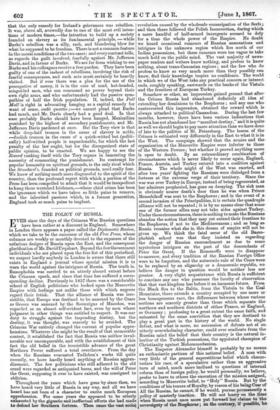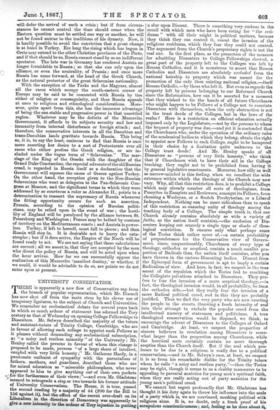THE POLICY OF RUSSIA.
EVER since the days of the Crimean War Russian questions have been rather at a discount in England. Somewhere in London there appears a paper called the Diplomatic Review, which we take to be the successor of the old Free Press, whose columns are weekly or monthly devoted to the exposure of the nefarious designs of Russia upon the East, and the consequent glorification of Mr. David Urquhart. Beyond the few Government individuals who are placed upon the free list of this periodical, we suspect hardly anybody in London is aware that there still exists in England a journal whose special mission it is to warn the world against the intrigues of Russia. The truth is, Rassophobia was carried to an utterly absurd extent before the Crimean epoch, and since that time has suffered a corre- sponding decline. Previously to 1857 there was a considerable school of English politicians who looked upon the Muscovite Empire with feelings not unlike those with which negroes regard their fetish. That the alliance of Russia was irre- sistible, that Europe was destined to be annexed by the Czars as Greece was annexed by the Sovereigns of Macedon, was regarded as an almost self-evident fact, even by men whose judgment in other things was entitled to respect. It was our duty to struggle against the impending destiny, but the destiny, it was thought, was scarcely to be avoided. The Crimean War entirely changed the current of popular appre- hensions. Whatever else might be the result of that memorable contest, it established the fact that Russia was neither invul- nerable nor unconquerable, and with the establishment of this fact the old belief in the irresistible advance of the great Northern Power suffered a total overthrow. From the day when the Russians evacuated Todleben's works till quite recently, we have hardly heard anything of Russian aggran- dizement. The few politicians who still adhered to the old creed were regarded as antiquated bores, and the will of Peter the Great, supposing it ever to have existed, was consigned to oblivion.
Throughout the years which have gone by since then, we have heard very little of Russia in any way, and all we have heard has not been of a character to excite much European apprehension. For some years she appeared to be utterly exhausted by the gigantic and ineffectual efforts she had made to defend her Southern fortress. Then came the vast social revolution caused by the wholesale emancipation of the Serfs ; and then there followed the Polish Insurrection, during which a mere handful of half-armed insurgents seemed to defy for a time the whole power of the Empire. No doubt we heard occasional rumours of Russian annexations and intrigues in the unknown region which lies north of our Indian possessions, but these rumours were too vague to take much hold on the public mind. The vast majority of news- paper readers and writers know nothing, and profess to know nothing, about trans-Caucasian regions ; and the few who do profess to know so very much more than they possibly can know, find their knowledge inspire no confidence. The world in which we of the West take any practical concern or interest ends, roughly speaking, eastwards on the banks of the Vistula and the frontiers of European Turkey.
Somehow or other, an impression gained ground that after- the Crimea Russia had abandoned definitely all idea of extending her dominions to the Bosphorus; and any one who- controverted this impression, obtained the reward which is- always attached to political Cassandras. During the last few months, however, there have been various indications that Russia has not abandoned her "manifest destiny," and it is quite as well we should begin to pay more attention than we have done of late to the politics of St. Petersburg. The lesson of the Crimea is estimated very differently in the East to what it is in the West. The campaign showed that the armies and the- organization of the Muscovite Empire were inferior to those of the Western Powers ; but whether it proved anything more- is open to doubt. By an extraordinary combination of circumstances which is never likely to occur again, England, France, Austria, and Turkey entered into a coalition against Russia. The whole might of the West was exerted, and after two years' fighting the Russians were dislodged from a fortress at the extreme verge of their territory. Since the war was over Turkey in Europe, instead of being regenerated, as her admirers prophesied, has gone on decaying. The sick man is obviously nearer death's door than he was when Prince Menschikoff was sent to the Bosphorus ; and in the event of a second invasion of the Principalities, it is certain the quadruple alliance will not be repeated ; it is by no means clear that some- one of the former allies may not take sides against Turkey. Under these circumstances, there is nothing to make the Russians abandon the notion that they may yet extend their frontiers to the Bosphorus, if not to the Mediterranean ; and as long as- Russia remains what she is, this dream of empire will not be given up. We think the fatal error of the old Reuse- phobish school was that they insisted on regarding- the danger of Russian encroachment as due to some- mysterious intrigues on the part of the descendants of Peter the Great. If the Romanoffs were to disappear to-morrow, and every tradition of the Russian Foreign Office were to be forgotten, and the autocratic rule of the Czars were- to be replaced by an oligarchy or a democratic republic, we believe the danger in question would be neither less nor. greater. A very slight acquaintance with Russia is sufficient to convince any one who possesses the faculty of observation that that vast kingdom has before it an immense future. From the Black Sea to the Baltic, from the Vistula to the Una Mountains, there extends a country occupied by one more or- less homogeneous race, the differences between whose various sections are scarcely greater than those which separate the. northern and southern districts of either France, or England,. or Germany ; professing to a great extent the same faith, and animated by the same conviction that they are destined to play a great part in the history of the world. No single defeat, and what is more, no succession of defeats not of ait utterly overwhelming character, could ever eradicate from the- Russian mind the belief that their country is the natural in- heritor of the Turkish possessions, the appointed champion of Christianity against Mohammedanism. The Emperor Alexander himself is probably by no means- an enthusiastic partizan of this national belief. A man with_ very little of the general superstitious belief which charac- terizes his race, of a speculative rather than an aggressive. turn of mind, much More inclined to questions of internal reform than of foreign policy, he would personally, we believe, prefer to leave to others the execution of the mission assigned, according to Muscovite belief, to "Holy" Russia. But by the- conditions of his tenure of Royalty, by reason of his being Czar of All the Russias, he cannot, if he would, pursue permanently a. policy of masterly inaction. He will not hurry on the time when Russia must once more put forward her claims to the- sovereignty of the Bosphorus ; on the contrary, if possible, he will defer the arrival of such a crisis ; but if from circum- stances he cannot control the time should come when the Eastern question must be settled one way or another, he will not be found untrue to the traditions of his dynasty. Now, it is hardly possible to avoid the conviction that a great change is at hand in Turkey. Ere long the rising which has begun in Crete may extend to the other Christian provinces of the Porte, and if that should be so, Russia cannot stand by as an indifferent spectator. The late war in Germany has rendered Austria no longer formidable to Russia ; so that she can rely upon the alliance, or even the neutrality, of Prussia; and once more Russia has come forward, at the head of the Greek Church, as the natural protector of the great Sclavonian nationality.
With the exception of the Turks and the Magyars, almost all the races which occupy the south-eastern corner of Europe may be said to be connected with Russia by ties either of religion or consanguinity, and thus Russia appeals at once to religious and ethnological considerations. More- over, quite apart from this, she has the immense advantage of being the one stable and progressive power in that unsettled region. Whatever may be the defects of the Muscovite Government, it affords to its subjects security and law and immunity from internal disturbance or foreign attack ; and, therefore, the conservative interests in all the Danubian and trans-Danubian lands gravitate towards Russia. This being so, it is, to say the least, ominous to find that Russia is once more asserting her desire to a sort of Protectorate over all races who either profess the Greek religion, or are in- cluded under the vague term of " Sclavonian." The mar- riage of the King of the Greeks with the daughter of the Grand Duke Constantine, the especial advocate of the old Russian creed, is regarded in Russia itself as a declaration that the Government will espouse the cause of Greece against Turkey. On the other hand, the reception given to the Non-Russian Sclavonians who went as delegates to the Pan-Sclavonic Con- gress at Moscow, and the significant terms in which they were addressed by so courteous a ruler as Alexander IL, points to a determination to reassert the supremacy of Russia whenever the fitting opportunity occurs for such an assertion. Prussia, according to the opinion of Russian politi- cians, may be relied upon in the event of war ; the hosti- lity of England will be paralyzed by the alliance between St. Petersburg and Washington ; France may be bribed by cessions of territory on the Mediterranean coasts ; and Austria is power- less. Turkey, if left to herself, must fall to pieces ; and then Russia will step in. It is desirable not to hurry the cata- strophe; but if it does arrive, the Empire of the North will be found ready to act. We are not saying that these calculations are correct ; all we assert is, that they are accepted by the men who direct the policy of Russia, and will be acted upon when the hour arrives. How far we can successfully oppose the realization of this Muscovite 'manifest destiny,' or whether, if we could, it would be advisable to do so, are points we do not enter upon at present.































 Previous page
Previous page